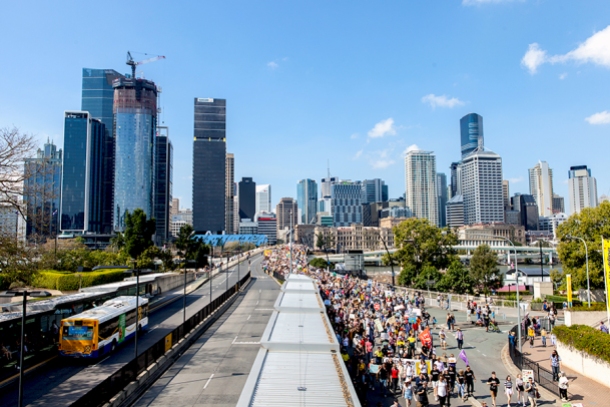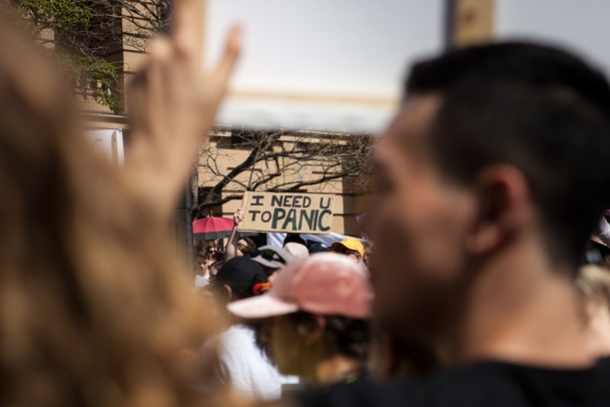Climate activism votes with its feet
With mounting scientific data and increasingly urgent warnings being made about the potential effects of climate change, it is perhaps no surprise that people around the world are beginning to take a stand to demand action from their governments.
Students and their supporters gathered to send a message to pressure the government to undertake immediate climate action. Photo: Athena Zelandonii.
The recent School Strike 4 Climate on September 20 was a particularly striking example of escalating climate activism, not least because the movement itself is barely 13 months old.
The September strike drew 300,000 protesters Australia-wide, as supporters left school and work to call for immediate action to combat the global climate crisis.
This was not the first School Strike 4 Climate event held this year, but it gained twice as many protestors as the first strike in March, making it one of the largest in the nation’s history and representing just a fraction of the four million people assembling for the cause across 161 nations around the world, from India to Iceland and Cape Town to Christchurch.
All in all, it was a powerful showing, and not bad for a movement that began after one Swedish schoolgirl, Greta Thunberg, staged a protest in August 2018 outside the Swedish (parliament), holding a sign that read “School strike for the climate”.
First year university student Oscar Delaney was one of 30,000 to join School Strike 4 Climate in Brisbane.
Mr Delaney said he had been involved in various climate action movements over the years due particularly to his concern over the disproportionate impact of climate change on developing nations.
“I’m very worried about the prospect for all our futures, and I think political activism like this is one way to challenge climate change,” he said.
“I think it’s great that we get a say not just through voting – I can’t vote yet because I’m seventeen – and I think protest and activism is an important way of having our say in politics,” Mr Delaney said.

And School Strike 4 Climate isn’t the only initiative taking it to the streets of Brisbane in the name of climate action.
The local branch of the equally new global group known as Extinction Rebellion (ER) are also making their presence felt, although they prefer more confronting strategies of non-violent direct action, which include activists blocking road access with their bodies, or attaching themselves to infrastructure.
Extinction Rebellion supporters also marched at the September 20 event as, despite their differing tactics, both groups agree on the need to communicate the existence of a climate emergency, the urgent need for change, and the need for a swift and just transition from coal to renewable energy.
Senior law lecturer at Queensland University of Technology, Dr Erin O’Brien, said activism groups made clear decisions on what tactics they would or wouldn’t use to bring attention to their cause, factoring in the symbolism of the act as well as what options were available to them.
“The acts of groups like Extinction Rebellion, where they’re disrupting society or disrupting people going about their daily lives, are very consistent with their message that climate change is an urgent problem, and that we need to stop what we’re doing and address it,” Dr O’Brien said.
“The reality for climate change campaigners is they’ve been trying for decades to get politicians’ attention to change policy, but have been unsuccessful, so they have to look now at what is left to them to do; what tactics can they use now if insider lobbying is failing, if signing petitions hasn’t worked, if sending letters to MP’s hasn’t worked?,” she said.
“Maybe the only thing left is civil disobedience.”

A major civil disobedience action carried out by ER in August was disruptive but forewarned, and despite 70 arrests for obstructing traffic and contravening police orders, it remained peaceful.
Regardless of the peaceful approaches undertaken by climate protesters, some media commentators and some politicians have taken a strong verbal stance against these popular movements, in some cases seeking to enact new legislation limiting the possibility for public action.
Columnist Gemma Tognini wrote in The West Australian that kids were being used as “pawns in climate wars”.
NSW Education Minister Rob Stokes warned that students missing school to strike for climate change action would be breaking the law.
But Resources Minister Matt Canavan was perhaps the most outspoken about the issue, telling 2GB he wanted children in school learning about how to build mines, do geology and how to drill for oil and gas, “which is one of the most remarkable science exploits in the world”.
“The best thing you’ll learn about going to a protest is how to join the dole queue,” Mr Canavan said.
But despite the divided opinions and even the prospect that striking during school hours was breaking the law, students and their supporters still turned out in droves for the September 20 protests around the country.

Australian National University science communications researcher Hannah Feldman said young people had a history of taking to the streets to support causes they were passionate about, but said School Strike 4 Climate had one crucial difference.
“The biggest change that I’ve seen is the demographic has shifted to be much younger, and much more inclusive of younger voices than we’ve really seen before,” Ms Feldman said.
“I think young people are routinely underestimated in how intelligently they can talk about these issues, and the key demographic of people organising this, they’re going to be voting in the next election,” she said.
“We allow 16 year olds to do a whole myriad of things in society,” Ms Feldman said.
“Younger than that they can work, they can participate in public life, they can make decisions about their own bodies, why is it that climate change is suddenly where things fall over?”
Those 16 year olds marched through Brisbane with their friends and family on September 20 as news helicopters hovered overhead and cardboard signs were repurposed as shade umbrellas.
Activists of all ages chanted their support for ‘Climate action, now!’, brandishing their banners with pleas on behalf of the trees, the air, the seas, the animals, and even the unborn.
“Koalas don’t have air conditioning”, one sign read.
“If turtles paid taxes you’d care”, another read.

In spite of politicians from the local to the federal level urging children to say in school rather than strike for the day, Dr O’Brien said the strikes were a clear example of people using the only tactic available to them.
“Young people can’t vote, they can’t run for office, and they have limited financial capacity to vote with their wallets and engage in boycotts, but what they can do is strike en masse and say ‘we are the next generation of voters and we care very passionately about this issue’,” she said.
While the next School Strike 4 Climate has yet to be announced, Extinction Rebellion’s Hannah Doole has been busy organising the International Rebellion Week from October 7 to 11, where the movement will continue to utilise a strategy of non-violent direct action.
“The lobbying that we’ve seen lead us up to this point has continued for the past 30 years or so, and hasn’t created the changes that we need for a safe or even habitable planet in the next century,” Hannah Doole said.
“The vast majority of Australians recognise climate change as a catastrophic risk and are willing to sacrifice something for it; the next step is to provide them with something to sacrifice in order to force that change,” they said.
Extinction Rebellion activists take part in disruptive actions well aware of the illegalities involved, and Dr O’Brien said this was for a clear purpose.
“It says ‘we’re drawing a line here, we are willing to be arrested for the sake of this cause’, and it really elevates the urgency of the issue,” she said.
There are several instances of successful direct action in Australia, where perhaps the most well known are those against the Franklin Dam in the early 1980s, or the more recent Bentley fracking blockade in northern New South Wales.

And like these movements, Hannah Doole said they believed ER’s power lay in its grassroots nature.
“We’re not going to see our salvation from a democracy that allowed the exploitation of this country… we’re going to find a solution from outside… empowering communities to speak out against what’s happening,” they said.
Dr O’Brien said activism offered important and valid tools to affect societal norms and influence policy change, and said we were lucky to have them.
“We have a robust democracy and a representative democracy, but that doesn’t mean we don’t need activism and resistance,” she said.
“We still need to have very public conversations about political issues, and if we feel that politicians aren’t addressing them, then activism is a way to put those issues on the agenda.”
As grassroots as they come, School Strike 4 Climate started with just one girl, half a world away, with a simple request: “Listen to the scientists”.
That one action by one girl sparked an international movement, giving people around the world the feeling of hope that simple actions can make a difference.
University student Oscar Delaney said he felt privileged to live in a democracy, and said this left Australians with a responsibility to act.
“I’d like to think that politicians are interested in what we have to say and care for our thoughts and opinions, and hopefully they’ll listen and take [that] into account in their policies,” he said.













